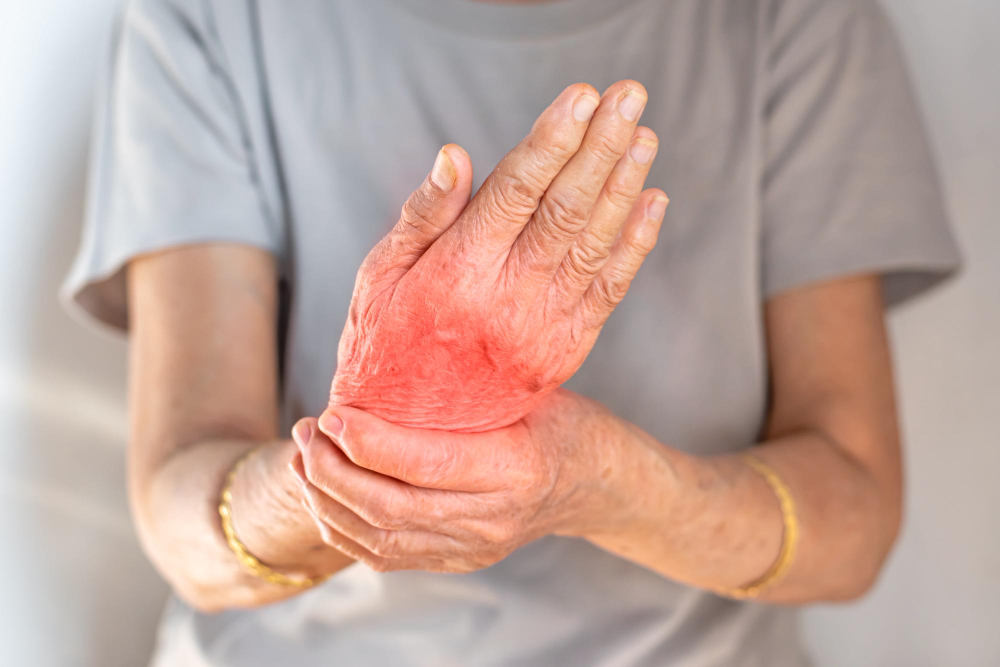What is Rheumatoid Arthritis?
Rheumatoid Arthritis is a long-term condition that causes pain, swelling, and stiffness in the joints. Unlike simple joint pain, this disease is an autoimmune disorder. This means the body’s immune system attacks its own tissues. As a result, joints become inflamed and can get damaged over time. In Ayurveda, this condition is known as “Amavata.” Here, it is believed to be caused by an imbalance of the body’s natural energies, or doshas. Early detection and care can help manage symptoms and improve quality of life.
Common Symptoms of Rheumatoid Arthritis
Many people notice joint pain first. However, other symptoms often appear as well. For example, you may feel:
Sometimes, symptoms can come and go. But over time, they may get worse if not treated. Therefore, early care is important.
Causes and Risk Factors (with Ayurvedic Perspective)
Doctors do not know the exact cause of Rheumatoid Arthritis. However, both modern medicine and Ayurveda offer some ideas. In modern science, genetics, hormones, and infections may play a role. Family history can increase your risk. Women are more likely to get this disease than men.
From an Ayurvedic view, Rheumatoid Arthritis or Amavata is caused by the build-up of “Ama” (toxins) and an imbalance in “Vata” dosha. Poor digestion, unhealthy diet, and a sedentary lifestyle can lead to this imbalance. In addition, stress and lack of sleep may make symptoms worse.
Common risk factors include:
Diagnosis Methods
Doctors use several steps to diagnose Rheumatoid Arthritis. First, they ask about your symptoms and medical history. Next, they do a physical exam to check for swollen or tender joints. Blood tests can help find signs of inflammation or certain antibodies. Sometimes, doctors use X-rays or ultrasound to see joint damage.
In Ayurveda, diagnosis also includes checking your pulse, tongue, and digestion. Both approaches aim to find the root cause and guide treatment. Early diagnosis helps prevent joint damage and improves outcomes. (Source: CDC, WHO)
Ayurvedic Approaches to Management and Treatment
Ayurveda offers natural ways to manage Rheumatoid Arthritis. The main goal is to balance the doshas and remove toxins. Treatment plans are often tailored to each person. Common Ayurvedic methods include:
However, it is important to use these methods under the guidance of a qualified Ayurvedic specialist. Combining Ayurveda with modern care can offer better results for many people.
Lifestyle and Dietary Guidance
Simple lifestyle changes can help manage Rheumatoid Arthritis. For example, Ayurveda suggests:
In addition, gentle stretching and yoga can keep joints flexible. Always listen to your body and avoid overexertion.
Prevention Tips
While you cannot always prevent Rheumatoid Arthritis, some steps may lower your risk. For instance:
Even small changes can make a big difference over time.
When to Consult a Healthcare Professional
If you notice joint pain, swelling, or stiffness that lasts more than a few weeks, it’s important to see a doctor. Early treatment can prevent further joint damage and improve long-term outcomes. Additionally, before starting any herbal remedies or therapies, it’s crucial to consult a qualified Ayurvedic specialist at Shri Kerala Ayurveda Vaidya Sala.


